
Blog
The Second World War resulted in the deaths of around 85 million people. Additionally, tens of millions more people were displaced. However, amid all the carnage, people demonstrated remarkable courage, fortitude, compassion, mercy and sacrifice. We want to honour and celebrate all of those people. In the War Years Blog, we examine the extraordinary experiences of individual service personnel. We also review military history books, events, and museums. We also look at the history of unique World War II artefacts, medals, and anything else of interest.
World War One Missing Manuscript Returns Home
In this book review we take a look at a lost manuscript of the Great War finally published. Field Dressing by Stretcher Bearer, France 1916 – 1919, is a slim volume of World War One poems by Alick Lewis Ellis. He served as a stretcher bearer with the 2/3rd London Field Ambulance, 54th Division, London Regiment, and took part in the Battle of the Somme, Arras, Ypres and Cambrai.
Field Dressing by Stretcher Bearer, France 1916 – 1919, is a slim volume of World War One poems by Alick Lewis Ellis. He served as a stretcher bearer with the 2/3rd London Field Ambulance, 54th Division, London Regiment, and took part in the Battle of the Somme, Arras, Ypres and Cambrai. During his time on the Western Front, Alick took to writing poetry to capture and make sense of his experiences. His notebook of poems was lost for nearly a hundred years until someone anonymously handed it to Dan Hill at the Herts at War Society in 2017. Dan Hill subsequently tracked down Alick’s remaining family, and together they worked to publish Field Dressing by Stretcher Bearer. To recognise the essential role played by the Royal Army Medical Corps (RAMC) and military mental health charities, a proportion of the book’s profits will go to Combat Stress and Veterans With Dogs.
Alick Lewis Ellis appears to have led an unremarkable life. He had a basic education and looked forward to a career as a grocer if the war had not intervened. His war poems might not have the literary complexity and construction of Wilfred Owen, Robert Graves and Siegfried Sassoon. Nevertheless, they have merit and share many common themes with the famous war poets of his generation. His poems reflect the direct experiences of war. They celebrate their comrades, condemn the war leaders, scorn the indifference of many civilians, and express a longing for home. Unfortunately, we know nothing of Alick’s creative influences or inspirations. The documentary of his life is reduced to a few faded photos, sketchy family memories and military service records.
Regardless of the many horrors and privations of the Western Front, Alick seems to have maintained his sense of humour. In poems like Revenge, he jokes about the quality of Army food, especially the rock-hard biscuits issued to the troops. In Training and Reality, he uses humour to illustrate just how poorly depot life and parade ground drill prepared soldiers for combat. After the war, Alick returned to working in retail, but little else about his life is known. Sadly, he passed away in November 1953. Alick’s poems might not be the greatest literary works, but they are honest, funny and poignant. Regrettably, they tell us familiar stories as old as war itself.

